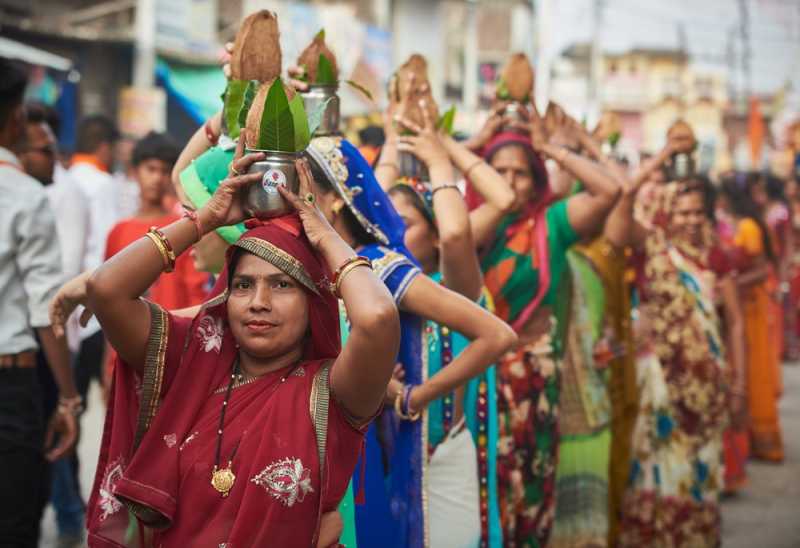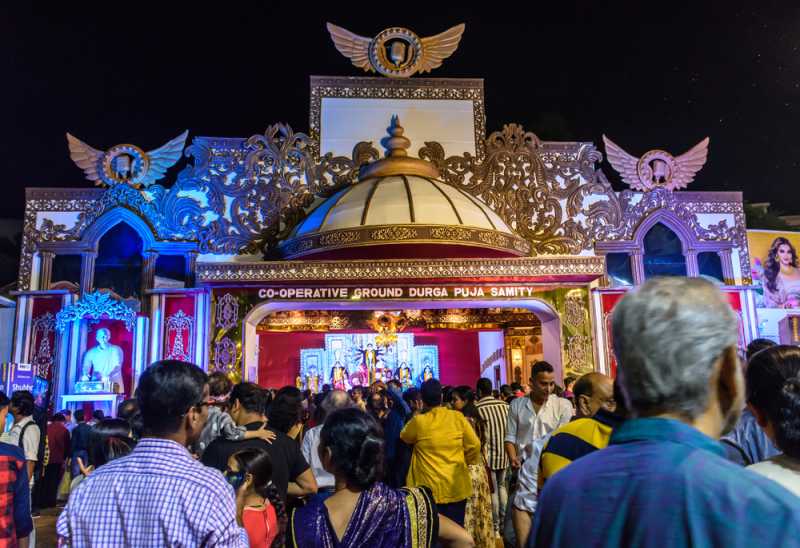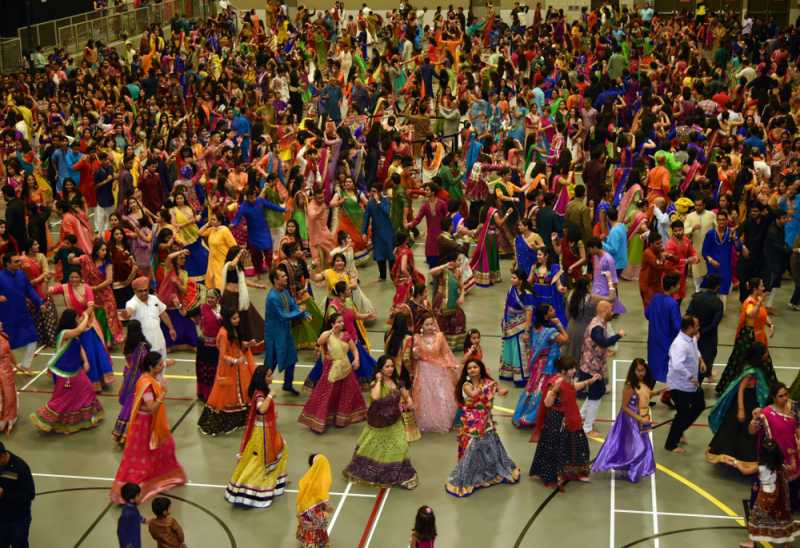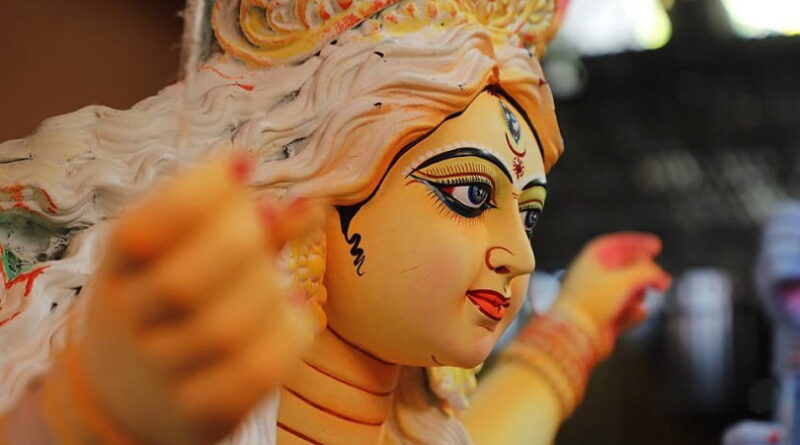Navratri Festival Celebration In India
Navratri means “nine nights” and is one of the most religious celebrated festivals in India. This 9-days-long festival is celebrated to honor the nine Avatars (forms) of Goddess Durga/Shakti during the month of Ashvin, or Ashvina (in the Gregorian calendar) usually between September–October. Different parts of India celebrate Navratri in their unique traditions and customs. Like for Gujaratis, Navratri is all about Garba and Dandiya, and for Bengalis, it is time to show one’s devotion to the goddess.
Generally, Navratri ends with the celebration of Dasara or Vijayadashami on the 10th day of Dussehra to celebrate Lord Ram’s victory over Ravana. The timing of the Navratri also depends upon the position of the Lunar month cycle, hence, sometimes instead of 9 days it is only celebrated for 8 days and the 9th day is celebrated as Dussehra. The Navratri festival is also celebrated in April, known as Vasant/Chaitra Navratri which marks the new year according to the Hindu calendar. So, let’s dive to know why and how Navratri is celebrated across the different corners of India.
Table of Contents

Like every other celebration, Navratri is also about celebrating the victory of good over evil. According to the great mythological legend, Goddess Durga battled with buffalo-headed demon Mahishasura for 9 days and finally beheaded him on the 9th day with a Chakra, and hence Indians celebrate the nine foremost forms called Navdurga.
Each day celebrates one of the Avatars of Goddess Durga, following Shailputri, Brahmacharini, Chandraghanta, Kushmanda, Skandamata, Katyayani, Kallratri, Mahagauri, and Siddhiratri respectively. A popular ritual- Kanya Pujan is performed on the 8th and 9th day of Navratri, known as Durgaashtmi and Durga Navami respectively, in which nine young girls along with a boy are worshiped with foot washing followed by tilak on the forehead and Kalaava tying on the wrist and then offer them with food and gifts and money.

While some belief in fasting all day on all nine days, others believe Navratri to be celebrated with great enthusiasm and lots of food and dance and folk music and songs. As each state celebrates Navratri in its own unique customs, these 9 days are the best time to visit India and witness the different traditions and cultures of India at their fullest. Let’s take a closer look at how the Navratri Festival is celebrated in different states of India.

Besides the celebratory victory of Goddess Durga over demon Mahishasura, Navratri is celebrated as the victory of Lord Rama over king Ravana in North India and ends with Dussehra on the 10th day followed by the burning of three effigies- Ravana, Meghanath, and Kumbhakarana. These nine days in the northern part of India are filled with joy, spirituality, fasting, Ramleela, prayers, and dance to honor Devi Durga. The last two days of Kanya Pujan are the most loved days when young girls are worshiped as nine forms of Durga and pay them offerings like food, sweets, clothing, money, toys, and anything useful. Varanasi is the best place in North India to witness the Navratri Celebration.

Navratri Festival is celebrated as Durga Pooja in West Bengal and North East India. Huge Pandals with the idols and statues of Maa Durga are placed riding a lion and shown with different weapons holding in her hands that she used to kill evil Mahishasura. These idols are worshiped for five days and then immersed in the river on the fifth day. You cannot miss attending the Maha Aarti every evening and indulging in the dance to the sound of Dhol. Kolkata is the most visited city to celebrate the festivities of Navratri in its full swing.

In the states of Western India, especially in Gujarat, Navaratri is the most celebrated festival with the folk dance form, Garba or Dandiya Ras Garba. The Garba is derived from the Sanskrit word Garbha which means ‘womb,’ which during Navratri represents life within the womb. While the Garba is only played by women in Gujarat, Dandiya is another folk dance in which men and women form a circle and dance with the decorated bamboo sticks called dandiyas in their hands. Every man dresses in traditional wear Kedia and the woman dresses in Ghaghra and Choli. Though not necessary, some people keep fast all the 9 days and follow the rituals like in North India.

In the parts of southern India, the Navratri festival is celebrated with the exhibition of dolls and puppets figurines that depicts the enactments in form of Yakshagana, a form of musical street play, from Puranas during every 9 nights of Navratri known as Bommala Kovulu in Telugu, Bombe Habba in Kannada, Bommai Kolu in Tamil, and Bomma Gullu in Malayam. In Kerala, it is the festival of education known as Vidhya-Aarambham (beginning of knowledge). People put books and tools in front of the goddesses and offer fruits, rice, jaggery, and roasted bread. In Andhra Pradesh, Navratri is celebrated as Batukamma Panduga and women offer prayers and decorate home temples with Batukamma flowers arranged in seven parallel circles and fruits and seek blessings from the goddess mother.
Durga Puja– One of the most revered sights to catch during the Navratri is Durga Aarti each evening in all the small and big temples in the town. People in their homes place the idols of Maa Durga and her 4 children made from cow dung or soil and pray to them by singing Bhajans, Aartis, and dance.
Kanya Pujan– On the last days of Navratri, Durga Ashtami or Durga Navami, the most important ritual, Kanya Pujan is performed at homes and temples during which young girls from the neighbourhood are invited into homes and worship as goddesses followed by the rituals of foot washing, tilak, and finally giving them offerings like food, clothes, gifts, and money.
Rameela– Along with celebrating nine Avatars of Goddess Shakti, these nine days also celebrate the battle between Lord Rama and Ravana. The local artists enact the different scenes from the epic Ramayana for the 9 auspicious days and end on the 10th day of Dussehra with the burning of the three effigies- Ravana, Kumbhakarana, and Meghanath.
Mysuru Dussehra in Mysore Palace, Durga Puja in Kolkata, Dandiya Ras Garba in Ahmedabad, Ram Leela in Varanasi, and pilgrimage yatra to Vaishno Devi in Katra, Jammu are some of the best ways to celebrate Navratri Festival in India this year and observe the unique ways in which people celebrate the festival to pray for good health and prosperity. So, why wait for so long? Plan your trip to these places to honour the 9 incarnations of Devi Shakti in more than a few different ways with Safar Mentor.



